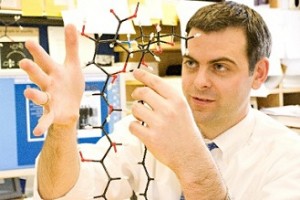
Marty Burke grew up in Manchester, Maryland and graduated in 1998 with a degree in chemistry from Johns Hopkins University. He then moved to Harvard Medical School as a PhD/MD student in the interdisciplinary Health Sciences and Technology program. From 1999-2003 Marty completed his thesis research in organic synthesis as an HHMI Graduate Fellow under the direction of Professor Stuart Schreiber in the Department of Chemistry at Harvard University. Thereafter, he completed his clinical rotations as an NIH Fellow in the Medical Scientist Training Program and graduated from medical school in 2005.
That same year Marty began his independent career as an Assistant Professor in the Department of Chemistry at the University of Illinois at Urbana-Champaign. In 2009 he became an Early Career Scientist of the Howard Hughes Medical Institute, and was promoted to Associate Professor with tenure in 2011 and Full Professor in 2014. His group’s research focuses on the synthesis and study of small molecules that perform protein-like functions. Such molecules may ultimately serve as substitutes for missing or dysfunctional proteins that underlie human diseases, thereby operating as prostheses on the molecular scale. To enable these studies, Marty’s group is pioneering a synthesis strategy, dubbed iterative cross-coupling, that aims to make the process of complex small molecule synthesis as simple, efficient, and flexible as possible. This work has led to the development of more than 175 commercially-available MIDA boronate building blocks that are now enabling the more effective synthesis of small molecules in many different academic and industrial institutions throughout the world. Marty’s group is now harnessing the power of this chemistry to systematically dissect the structure/function relationships that underlie the protein-like activities of a variety of prototypical small molecules, including the ion channel-forming polyene macrolide amphotericin B and the self-preserving antilipoperoxidant carotenoid peridinin. Collectively, these efforts seek to build the foundation for the development of molecular prosthetics as a powerful and general strategy for the understanding and betterment of human health.
Marty is the recipient of a number of honors and awards, including the Thieme IUPAC Prize in Synthetic Organic Chemistry, the IOCF lectureship award, the Hirata Memorial Gold Medal from Japan, the Early Career Scientist Award from the Howard Hughes Medical Institute, the American Chemical Society Kavli Foundation Emerging Leader in Chemistry Lecturer, the American Chemical Society Elias J. Corey Award for Outstanding Original Contribution in Organic Synthesis by a Young Investigator, the American Chemical Society Arthur C. Cope Scholar Award, the UIUC Innovation Discovery Award, the Novartis Chemistry Lectureship, the Arnold and Mabel Beckman Foundation Young Investigator Award, a Sloan Foundation Research Fellowship, an NSF CAREER award, the Dreyfus Foundation New Faculty Award, the Bristol-Myers Squibb Unrestricted Research Grant in Synthetic Organic Chemistry, the Eli Lilly Grantee Award, the Amgen Young Investigator Award, the AstraZeneca Excellence in Chemistry Award, and he has been named “one of the world’s 35 top innovators under age 35” by Technology Review. He has also been recognized multiple times as a “Teacher Ranked as Excellent” by the UIUC Center for Teaching Excellence.
A complete list of Marty’s publications and awards can be found on his current C.V.
For a biographical sketch of Marty as a “Scientist to Watch” in The Scientist magazine click here.
To view a free Chem. and Eng. News “Webinar” in which Marty describes the group’s research see:http://pubs.acs.org/cen/webinar/webinar-sigma.html
For a discussion with Marty on being a chemist and the prospect of molecular prosthetics, see:http://publications.nigms.nih.gov/chemhealth/chemist_burke.htm